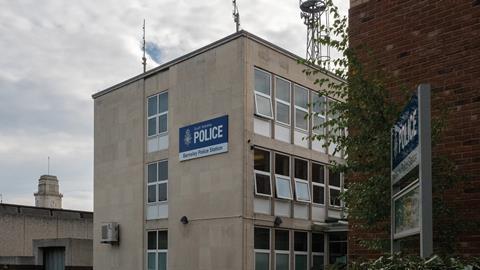Attending police stations to provide legal advice is poorly paid, often done out-of-hours, and involves dealing with people in highly stressful situations. It is not only hard and demanding work, but also of huge importance because what happens in the police station, and the careful judgements solicitors are required to make there, affect entire cases. The critical importance of this work is why the Law Society has been lobbying for proper rates of pay.


Providing face-to-face legal advice for suspects at police stations is a vital protection for suspects in the extremely vulnerable circumstances of police detention. It is a key component of the safeguards introduced by the Police and Criminal Evidence Act 1984 (PACE) to remedy unprofessional police practice, and our profession rose to the challenge to create a 24/7 service, free to all detainees. The right to have one’s solicitor present in custody is now considered essential in normal circumstances.
Pandemic interview protocols
The unprecedented nature of the Covid-19 pandemic resulted in circumstances that were far from normal, however. Attendance at a police station became dangerous, with reports of some solicitors and police station advisers having fallen ill and some, sadly, having died. Swift, safe solutions had to be sought during the first lockdown to ensure suspects could continue to access legal advice.
The Law Society and other criminal solicitor representative associations, the Crown Prosecution Service and National Police Chiefs’ Council, worked together to introduce the police station protocol. It allows for advice to be provided to suspects remotely, rather than in person, so long as the suspect consents to be advised remotely.
Nobody claimed the protocol was a perfect solution, but the pandemic meant the health and even the lives of lawyers, their clients, appropriate adults and police officers were all at risk.
Remote attendance by solicitors was the best available solution to maintain both safety and the provision of essential advice in these most difficult circumstances.
Recent research has flagged concerns as to whether remote advice does effectively protect suspects’ rights, and this is something that needs careful further investigation before any long-term change to the right to face-to-face advice is considered.
Remote advice was only introduced as a temporary measure due to Covid-19 and we are clear that it is imperative to revert to in-person advice as soon as possible as the pandemic recedes.
The protocol was updated from 17 May this year, and no longer applies in cases involving suspects who are children or vulnerable adults requiring an appropriate adult.
As the vaccination rollout continues and restrictions are relaxed – with last Monday (19 July) the latest step on the road map and the lifting of self-isolation for those double-jabbed anticipated in August – solicitors should soon be able to begin to return to providing face-to-face advice and assistance in police stations for all detainees.
Face-to-face advice is key to ensuring that clients understand the situation they are in, the options available to them, and the implications of the decisions they take at one of the most critical moments in criminal proceedings.
The presence of a solicitor ensures access to justice for suspects, as well as helping promote high standards of police behaviour.
We see from the Police, Crime, Sentencing and Courts Bill 2021 that the government is paving the way for more and permanent remote justice in a number of other contexts.
The pandemic has given impetus to the adoption of technology throughout the justice system, which is welcome in many cases. However, we believe permanent adoption of remote police station legal advice would have a detrimental effect on solicitors, their clients and the police, even if it can, at first glance, appear more efficient and convenient.
It could be a slippery slope towards a centralised call-centre provision of legal advice, leaving suspects inadequately represented, and perhaps ineffectively protected from inappropriate pressure by police officers, and providing a huge threat to the criminal defence profession. Conversely, such a system would also be less effective at protecting the police from false allegations by suspects of oppressive behaviour.
Keeping interviews safe
Of course, safety remains paramount; and if a person in custody is Covid-positive or strongly believed to be then the remote option will remain available, as is the case now, including for cases involving children and other vulnerable suspects.
Where there are problems with personal protective equipment, safety and inability to socially distance at stations these should continue to be raised with the police locally or reported to the Practice Advice Service. Risk assessments of police stations should be made available to solicitors on request.
In any case where a solicitor does not feel it is safe to attend and where remote advice is not an option, it is their right to decline the case. But they must hand it back to the duty solicitor call centre, allowing the detainee to access legal advice elsewhere. This may create situations where the police struggle to find any solicitor willing to attend. But this will shine a spotlight on police stations with particular issues.
A suspect’s right to face-to-face advice is so important that it is vital solicitors take the necessary steps to enable it to happen, even if an individual solicitor does not feel able to offer it themselves.
Stuart Nolan is chair and Richard Atkinson a member of the Law Society’s Criminal Law Committee
































2 Readers' comments